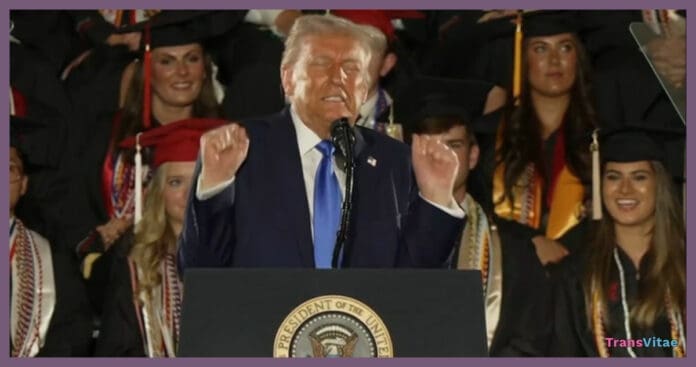During what should have been a celebratory moment for graduating students at the University of Alabama, U.S. President Donald Trump turned a commencement address into a political rally, complete with mocking impersonations of transgender athletes and inflammatory rhetoric that demeaned the transgender community.
Speaking before more than 6,000 students and families in Tuscaloosa on Thursday night, Trump leaned heavily into one of his favorite talking points: attacking transgender inclusion in sports. At one point in his speech, he acted out a bizarre impression of a female weightlifter losing to a transgender woman. He let out moans and groans, feigning a struggle with a barbell, before transitioning into an exaggerated portrayal of a transgender athlete lifting with ease.
“My wife gets very upset when I do this. She says it’s not presidential,” Trump told the crowd. “But people like it.” Audience members responded with laughter and chants of “USA! USA!” This served as a reminder of the political theater that increasingly characterizes his public appearances.
The speech, which began with a shoutout to the university’s women’s track and field team, quickly pivoted into anti-trans rhetoric. Trump vowed to “protect women’s sports” by banning transgender women from participation, falsely declaring the issue a “97-3” consensus across the country. “Men will not be playing in women’s sports,” he declared, drawing the loudest cheers of the evening.
But behind the laughter and applause, many saw something darker: the sitting president of the United States using a college graduation ceremony to ridicule a marginalized community. Trump’s speech painted transgender women as interlopers, as threats, and as comedic props for political gain.
He recounted exaggerated stories of transgender participation leading to injuries for volleyball players, “windburns” for swimmers, and “destroyed overnight” records for weightlifting. Many of these anecdotes, frequently repeated in past speeches, are either misleading or completely fabricated.
Perhaps most disturbing to LGBTQ+ advocates was the tone: less policy and more mockery. Trump’s depiction of trans athletes wasn’t just dismissive; it was performative humiliation wrapped in a smirk. This is a man who once avoided military service with a medical note for bone spurs, now openly belittling women who have fought for their place on the playing field.
For transgender Americans, especially youth who already face disproportionate levels of bullying, violence, and discrimination, the message was clear: the highest office in the land sees you as a joke.
“This isn’t leadership, it’s cruelty packaged as comedy,” said one LGBTQ+ advocate who attended the ceremony. “Graduation is supposed to be about hope. Instead, our community walked away feeling targeted.”
While Trump’s remarks may have earned applause from a crowd predisposed to his worldview, Alabama gave him 64% of the vote in 2024, the long-term impact is chilling. By using his platform to stoke division, the president once again made it clear that the rights and dignity of transgender people remain on the chopping block in his America.
For the thousands of transgender students, athletes, and graduates across the country, this speech was a reminder that even in moments of celebration, respect is not guaranteed.
And for the rest of us, it’s a call to pay attention.


